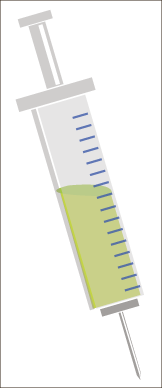Tips for people struggling to stay healthy
Modern medicine has separated Siamese twins conjoined at the head, but it has not solved some of the smallest, yet greatest of human inconveniences — such as the flu.
Each year, medical professionals manufacture a vaccination for the influenza virus, commonly referred to as the flu, but opinions vary about the effectiveness of this preventative measure.
While not a guarantee that you will not contract the flu, a vaccination dramatically improves your odds of staying healthy, Jim Florence, a professor of public health in the Master of Public Health program at Liberty University, said.
What goes into a vaccine?
According to the Center for Disease Control (CDC), an influenza vaccine causes the body to develop antibodies to fight against the flu within two weeks of the vaccination. Each year, the CDC evaluates the different influenza strains from the previous season, as well as the trends around the globe. The flu vaccine is then developed using antibodies that will safeguard a person from the strands that will most likely hit the United States the hardest.
The seasonal vaccine provides antibodies for influenza B viruses, influenza A (H1N1) viruses and influenza A (H3N2) viruses.
According to Richard Lane, the director of the Master of Public Health Program, the vaccine is 62 percent effective in preventing the flu. The 38 percent of people who still get the flu even after an immunization do so because the particular mutation of the flu that they contract did not make it into the final flu vaccine cocktail.
Florence encouraged people to think about the flu vaccination process like a game of Russian roulette.
Each bullet represents a slightly different strain of the flu. It is far from perfect, but each strand included in the vaccine effectively removes a bullet from the chamber of the gun in your annual round of Russian roulette with the flu.
What about just toughing it out?
According to Florence, a flu shot is not an antibiotic or anti-viral medication. In fact, it is not a treatment at all. The vaccine does not fight any virus that is already in the body. It is only a preventative measure.
“There’s no benefit to letting the body fight,” Florence said.
Because the flu virus will mutate and return in a slightly different form in the next season, the body does not gain anything from fighting a battle where the rules change every year, Florence said.
Influenza is also deadly. It might not kill you, but it could kill someone within your sphere of contact. According to the CDC, since the organization began tracking the flu in America in 1976, between three and 49 thousand people have died every year from the flu. This number is primarily made up of the very elderly or the very young. Because of this fact, getting a flu shot becomes a public service.
According to Lane, you remain contagious for several days before you feel the side effects of the illness, and several days after you begin feeling better.
“You’re a carrier for a much longer time than you’re actually sick,” Lane said.
Avoiding the flu
Flu shots, available in the form of a shot or nasal spray, can be purchased for around $20 to $30 at most pharmacies such as Walmart, Kroger, Walgreens and CVS. However, most health insurance plans will cover the price of the vaccine at little, if any, cost to you.
There is a variety of ways to help boost your natural immune system that do not involve needles or supplements. According to Lane, using hand sanitizer regularly, especially after handling commonly used items, like your Flames Pass, is smart.
Coughing into a sleeve does more than just keep others from breathing germs. According to Lane, the fabric in the clothing actually dries out the virus, which reduces the possible number of transfers.
Florence also suggested a few things that you can incorporate into your daily routine.
During a shower, alternating hot and cold water actually helps your body distribute disease-fighting white blood cells, which helps keep your immune system in the best possible shape. Getting plenty of rest, exercising and lowering your sugar intake help increase the body’s white blood cell count as well.
Unfortunately, you are forced play the influenza-themed game of Russian roulette, but preparing yourself in the right way could mean the difference between winning and losing.
